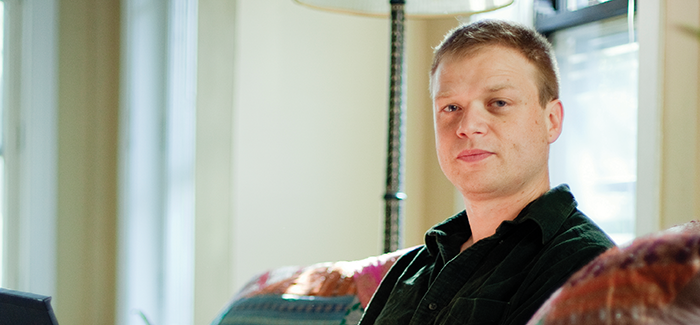Forest Gregg identifies the four major intentions of civic apps (like the type DataMade hosts): to inform, to persuade, to provide access, or to change the way democracy works. (Photography by Drew Reynolds)
A grad student puts the Chicago school of sociology on data overdrive.
Strictly speaking, Forest Gregg, AB’04, AM’12 (Sociology), didn’t run away and join the circus. After earning his bachelor’s in sociology, he hit the road as part of a small troupe he’d formed with friends: Runaway Circus. They crossed the country in a vegetable oil–fueled bus performing for audiences of five people to 400, in bars, churches, parks, and at least one “radical intentional community.”
When the bus broke down, the circus broke up, so Gregg followed his biofuels interest, working as a research and systems designer at
Frybrid in Seattle, ultimately penning the 2008 handbook
SVO: Powering Your Vehicle with Straight Vegetable Oil (New Society Publishers). Since returning to the University in 2010 to pursue a doctorate in sociology, he has helped organize the
Computational Social Science Workshop and the methods course Computing for Social Science. Gregg is also an owner of
DataMade, a civic technology company focused on open data and open-source software to “make people more powerful.”
What drew you back to sociology—mathematical sociology in particular?
Around 2007 I started to think about the predictive models companies were using—recommendations from
Amazon, your credit card company asking about ”strange” purchases. In all these online applications, computer scientists and machine learning folks have really shown that large parts of social action are predictable. It’s pretty amazing. But these engineers are mainly interested in making predictions. They are typically not very interested in what produces the predictability. That’s what social scientists are supposed to do—understand the causes of predictable social action. And since very few social scientists were engaging with these big applied social science projects, it seemed to me there was a real opportunity opening up.
Were you always a math and computer guy?
No, but one of the really great things about UChicago’s Department of Sociology is you have a lot of freedom to take courses across the University. So because I’d taken a lot of social science classes as an undergrad, when I came back for grad school I was able to study computer design, statistics, linear algebra, even machine learning at the Toyota Institute.
What’s your main interest?
I’m interested in understanding how different kinds of land uses follow and affect one another across the city. That’s one of the most traditional things you can study in sociology, and of course UChicago is an important originator of urban sociology, especially when it comes to how one neighborhood group succeeds another and the competitive and synergistic relationship of housing and commercial zones. There are now opportunities to model some of these interrelationships. With computational tools, we can ask: when is a coffee shop helped if there’s a little boutique nearby? We’ve made it more predictable to say: if you open a
Starbucks, what other kinds of businesses might open up next.
How does your work at DataMade overlap with your academic research?
DataMade has been a great vehicle for me to get to know and talk to the
City of Chicago and the nonprofits interested in the work I’m doing on neighborhood formation and economic development policies. It has also provided good leads on the kinds of data that are available out there.
How do you see qualitative and quantitative sociology working together?
Sociologists—and people in general, if they spend time thinking about it—understand what part of a city is their neighborhood, and they have good reasons for thinking that. Quants should be so lucky. People who do quantitative work don’t have that informed, rich understanding of space; they use census blocks and other convenient administrative boundaries. I’d like to see us find an approach that can draw upon people’s thoughtfulness and experience of a place to define meaningful social borders. The paper I’m working on now describes a methodology that trusts people’s qualitative understanding of what makes a neighborhood and reproduces, through more objective measures, a way of breaking up the city into areas that are experientially meaningful to the people who live in them.

